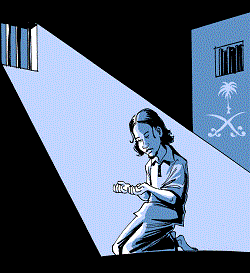In 2008, the government of Saudi Arabia established the Specialized Criminal Court (SCC) under the guise of prosecuting terrorism-related cases. In the seven years since its inception, however, the court has used anti-terrorism legislation to target human rights activists and government critics. The new Penal Law for Crimes of Terrorism and its Financing allows the SCC to prosecute anyone who “disturbs public order, shakes the security of society or subjects its national unity to danger, or obstructs the primary system of rule or harms the reputation of the state.” The law’s ambiguity makes it ideal for targeting anyone who challenges the status quo.
Take, for example, the recent cases of Muhammad al-Bajadi and Yusuf al-Ahmad. Al-Bajadi’s group, the Saudi Civil and Political Rights Association, publicly challenged the Kingdom for media censorship and its treatment of political prisoners. Al-Ahmad also blogged about rights abuses in a public forum. The SCC sentenced Muhammad al-Bajadi to four years in prison in April 2012 and prohibited him from travelling outside the country for an additional five years. Al-Bajadi was charged with establishing an illegal human rights organization, slandering the Kingdom’s reputation, inciting rebellion among political detainees, and gaining possession of restricted books. The court also sentenced Yusuf al-Ahmad to five months in prison for “incitement against the ruler, stoking divisions, harming the national fabric, diminishing the prestige of the state and its security and judicial institutions, and producing, storing, and publishing on the internet things that can disturb public order.” Though very different, both sentences serve as a warning for anyone who might threaten the government’s authority.
Al-Bajadi and al-Ahmad’s cases are not unique. In October 2013, human rights activist and lawyer Waleed Abu al-Khair signed a petition demanding a constitutional monarchy. Additionally, through his civil rights organization, Monitor of Human Rights in Saudi Arabia (MHRSA), al-Khair called for the government to reform its operations, release political prisoners, and expand women’s rights. Although his work never threatened anyone, authorities sentenced al-Khair to three months in prison for signing the petition. In April, the Ministry of Interior decided to re-try al-Khair under a new anti-terrorism law for “speaking to the foreign media with the intention of harming the country’s reputation, “breaking allegiance with the King,” “inciting public opinion against the government,” and “insulting the country’s leaders and judiciary.” Al-Khair was sentenced to 15 years in prison with the possibility of parole after 10 years, followed by a 15-year travel ban. He was also ordered to pay 200,000 Saudi riyals ($53,300) and to take down all websites connected to his activism activity. Then, on 12 January 2015, the SCC revoked al-Khair’s parole after he refused to address the charges and acknowledge the court’s legitimacy.
The SCC continues to treat the Kingdom’s most progressive citizens like criminals. Mikhlif bin Daham al-Shammari is a human rights defender who worked to promote equality between Sunnis and Shia. In November 2014, authorities charged al-Shammari with visiting a Shia Muslim family and tweeting his desire to worship in a Shia mosque. They twisted the anti-terrorism law to sentence him to two years in prison and 200 lashes for “stirring public opinion by sitting with the Shi’a” and “violating instructions by the rulers by holding a private gathering and tweeting.” Al-Shammari had already been sentenced to five years in prison and a 10-year travel ban earlier in 2013 for his activism on behalf of Saudi Shia. The SCC upheld its first sentence in June 2014 after the new anti-terrorism law took effect and has now added the second.
Finally, the SCC targeted three lawyers, Abdulrahman al-Subaihi, Bandar al-Nogithan, and Abdulrahman al-Rumaih, in October 2014 after they publicly criticized the judiciary on Twitter. Under the new terrorism law, the men were charged with “disobeying the ruler,” “violating judicial integrity,” “contempt of courts and judicial independence,” and, under article 6 of the 2007 Anti-Cyber Crime Law, “producing, preparing, sending or storing material that could endanger public order, religious values or public morals”. The activists were sentenced to an additional five to eight years in prison on top of a fine of 1 million Saudi riyals ($266,666) that they had previously been issued for the same offense. In another great effort to silence citizens’ voices, the SCC banned all three activists from using social media.
Despite these attempts, the Saudi government cannot silence the voices of its bravest and most forward-thinking citizens. After all, a nation, like a chain, is only as strong as its weakest link. Human rights activists fortify Saudi Arabia’s chain by strengthening and empowering the Kingdom’s weakest citizens. By trying activists as terrorists, however, the SCC breaks that chain before it can even begin to form. The Saudi government’s ongoing misuse of the Penal Law for Crimes of Terrorism and its Financing draws attention away from real, pressing terrorist threats within the Kingdom’s borders. The Saudi government must afford its citizens fair and just trials if it hopes to remain strong in these turbulent times.
—
Katherine Kinnaird is a Saudi Advocacy Intern at ADHRB





